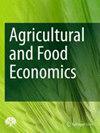COVID-19政府政策对国际葡萄酒贸易的影响
IF 4.5
2区 经济学
Q1 AGRICULTURAL ECONOMICS & POLICY
引用次数: 0
摘要
为控制COVID-19大流行对健康的影响,各国政府实施了各种限制性政策,如居家令和限制内部流动,这对消费产生了不利影响,从而对国际贸易产生了不利影响。这种情况甚至出现在贸易密集、生产受影响最小的产品上,比如葡萄酒。因此,为了更好地认识未来的危机,本研究评估了政府应对COVID-19的政策对国际葡萄酒贸易的影响。重力模型是研究贸易决定因素的一种基准方法,该模型使用20个出口国和214个潜在进口国的月度数据进行估算。研究结果表明,在其他条件不变的情况下,由于限制措施导致需求下降,葡萄酒出口流量的价值与进口国政府政策反应的强度呈负相关。然而,对于来自旧大陆的葡萄酒,这种影响大大减少,据推测,旧大陆的葡萄酒更具弹性,这一因素主要归因于它们在带有地理标志的葡萄酒出口中所占的份额更高。另一方面,只有旧大陆国家的出口受到出口国内部流动限制的负面影响,这反映了一种涉及多个中介机构的复杂供应链的商业模式,从而削弱了葡萄酒生产商和消费者之间的直接联系。本文章由计算机程序翻译,如有差异,请以英文原文为准。
The impact of COVID-19 government policy on the international wine trade
Abstract To control the health impact of the COVID-19 pandemic, governments implemented various restrictive policies, such as stay-at-home orders and restrictions on internal movement, which had adverse effects on consumption and, consequently, on international trade. This was observed even for products intensively traded and minimally impacted in terms of production, such as wine. Thus, to work towards a better awareness of future crises, this study assesses the impact of government policy responses to COVID-19 on the international wine trade. A gravity model, a benchmark approach for studying the determinants of trade, is estimated using monthly data for 20 exporting countries and 214 potential importing countries. The findings suggest that, ceteris paribus, the value of wine export flows was inversely related to the intensity of government policy response in importing countries due to lower demand provoked by restrictive measures. This effect was considerably reduced, however, concerning wines coming from the Old World, which are inferred to be more resilient, a factor primarily attributed to their higher share of wines exported with geographical indications. On the other hand, only the exports from Old World countries were negatively influenced by restrictions on internal movements in the exporting country, which reflects a business model with a complex supply chain in which several intermediaries are involved, thus weakening the direct linkage between wine producers and consumers.
求助全文
通过发布文献求助,成功后即可免费获取论文全文。
去求助
来源期刊

Agricultural and Food Economics
Agricultural and Biological Sciences-Agricultural and Biological Sciences (miscellaneous)
CiteScore
5.50
自引率
5.10%
发文量
29
审稿时长
13 weeks
期刊介绍:
Agricultural and Food Economics (AFE) is an international peer-reviewed and open access journal published on behalf of the Italian Society of Agricultural Economics. AFE welcomes research articles from economists, scholars and researchers from all over the world to publish problem-oriented and high-quality articles. AFE publishes only original articles from a wide variety of economic perspectives that address current and relevant issues related to the agricultural and food system. AFE publishes articles focused on applied analysis, the discussion of innovative results, and relevant policy and managerial implications. AFE seeks clearly written articles from experts in the field, to promote insightful understanding of the current trends in the agri-food system. Topics of specific interest to AFE include agricultural and food market analysis, agri-food firm management and marketing, organization of the agri-food chains, consumer behavior, food quality and safety issues, economics of nutrition and food security, food and health economics, agri-food policy and trade, sustainable rural development, natural and marine resource economics and land economics.
 求助内容:
求助内容: 应助结果提醒方式:
应助结果提醒方式:


